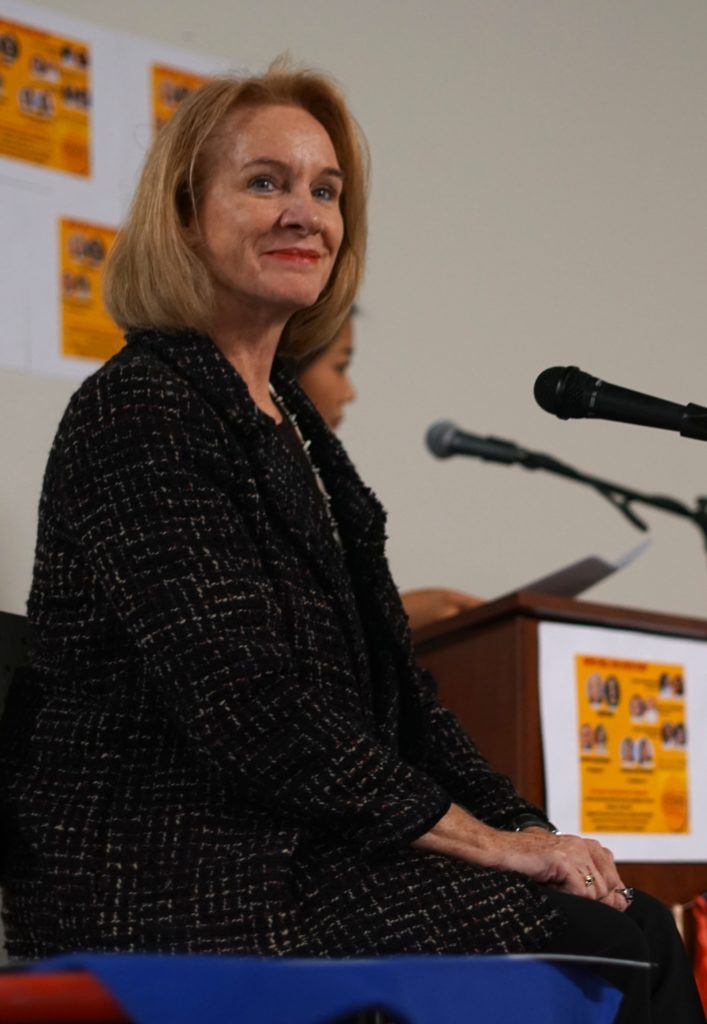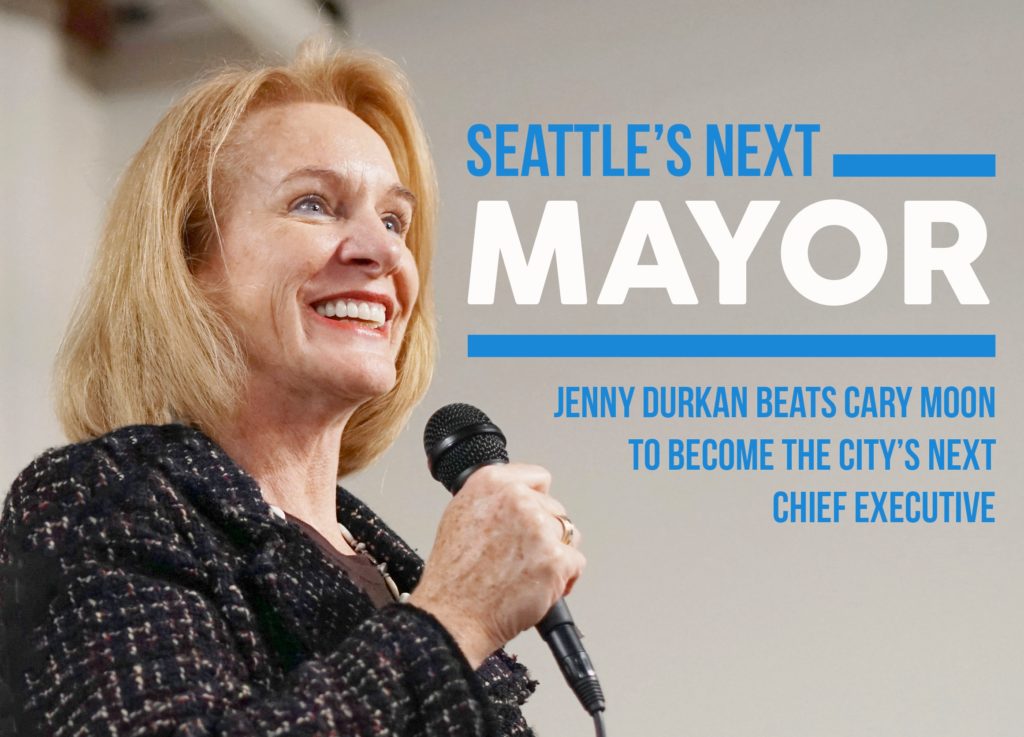Former U.S. Attorney Jenny Durkan has surged ahead of Cary Moon in the mayoral race, receiving more than 60 percent of the vote after the initial ballot drop. Durkan is ahead of Moon by over 20 percentage points, Moon having received nearly 40 percent of the vote.

Jenny Durkan at a debate with Cary Moon weeks ago in the Nagomi Tea House.
Durkan and Moon, both Democrats, ran on similar progressive platforms. However, Durkan was considered the more traditional candidate due to her experience in state government and her work as the first openly gay U.S. Attorney. With endorsements from Senator Patty Murray, Governor Jay Inslee and many of the prominent Seattle labor unions, Durkan solidified the perception of her role as the establishment candidate.
The decision of who to vote for was difficult for some Seattle residents. Jessie Dirks, a junior Environmental Studies and Spanish major, originally voted for Durkan in the primaries, but she supported Moon in the general election. She was interviewed before the election and said it was a tough decision because both candidates are qualified and take similar stances on important issues.
“The vibe I get from Jenny Durkan is that she’s more of the authority figure, and that she really knows what she’s doing,” Dirks said. “She has a lot of leadership experience and I think she would be really straightforward…Cary Moon [is] an urban planner, and in her writing, I hear more about collaboration.”
Dirks had especially noted that Durkan’s statement in the voter pamphlet concentrated on her own experience and ability to lead from the top down, while Moon’s statement in the voter pamphlet spoke to equity and distribution of power. Both candidates had similar liberal platforms, but for some voters it came down to one or two differences.
“The other issue that stuck out for me is that Cary Moon doesn’t want to keep doing the encampment sweeps, and I think that it is not the right approach to kick people out and magically expect them to have a place to go,” Dirks said.
The decidedly divisive issue of homeless encampment sweeps is one of the main points where the two candidates differed. Durkan is a firm supporter of removing the unsanctioned homeless encampments due to safety concerns, but she has proposed other strategies for tackling homelessness, including rehabilitation and mental health care.
When Durkan came to Seattle University in October for a mayoral debate, she spoke to the Spectator about an issue near and dear to the Seattle U community: housing.
“I think we have to dedicate more resources for figuring out [affordable housing] at all our universities [and] make sure that the students can afford to go here because it’s a real barrier for people—particularly if we want to attract more kids who are from disadvantaged neighborhoods or backgrounds,” Durkan said.
Durkan came in first in the primaries with about 28 percent of the vote, while Moon barely came in second with only 17 percent of the vote. As of the end of October, Durkan had collected $937,409 in campaign contributions, almost three times as much as Moon. Her expenditures were estimated at $674,414—more than double what Moon spent. Durkan also outstripped Moon in contributions to People for Jenny Durkan, an independent expenditure committee. Comcast and CenturyLink donated more than $50,000 to a business group supporting the committee.
Approximately 22.86 percent of registered voters voted as of the first count, which is low, but all the ballots have not been counted yet. King County Elections will continue to count the ballots and publish updated results once per day until Nov. 28. At that time the election results will be certified, and the elected mayor will start working that day due to former Mayor Ed Murray’s resignation.
Eric Sype, former SGSU President, watched the on-campus debate because he thinks being informed and voting is important.
“It is really important to be part of the political process and to use the political powers that are given to you, and we have a lot of exposure to candidates for high office like mayor, which is kind of cool,” Sype said.
Turnout for local elections tends to be low compared to national elections, and this is true for young voters in Seattle. In the last mayoral election, residents 65 and older voted at more than twice the rate of voters ages 18-25. This gives older voters a disproportionate say in who elected officials will be.
Voter registration is usually low at universities due to a lack of perceived ties to local politics by out-of-state students and the effort it takes to register. However, the issues covered in this race, specifically affordable housing and access to higher education, are pertinent to Seattle U students.
The Seattle Times called the election for Durkan, but Moon has yet to concede.
“There’s a lot of votes left to be counted, but…we are feeling really, really good about where we are, and I think you guys should celebrate,” Durkan told supporters at her election party.
Quinn may be reached at
qferrar@su-spectator.com








